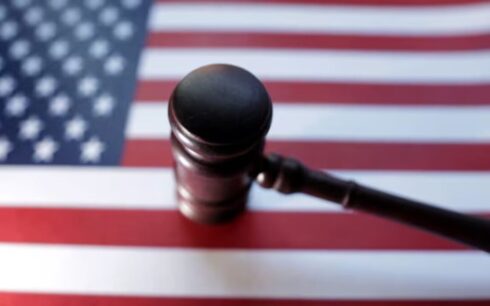Republican candidate Donald Trump and his Democratic opponent, Vice President Kamala Harris, accused each other of deepening national divisions on Wednesday, as the U.S. presidential campaign entered its final week.
In Green Bay, Wisconsin, Trump made a theatrical statement by donning an orange reflective vest and climbing into a garbage truck, a pointed response to a controversial comment from President Joe Biden. Biden had reportedly described certain Trump supporters as “garbage,” a remark Trump seized on as evidence of Democrats’ contempt for his base.
“Biden should be ashamed of himself,” Trump said from the truck, adding that Harris, as Biden’s running mate, was “guilty by association.” He told supporters, “You are not garbage; you are the heart and soul of America.”
However, Trump sought to distance himself from comedian Tony Hinchcliffe, whose recent comments disparaging Puerto Rico as “a floating island of garbage” ignited a backlash. “I don’t know him… I know nothing about him,” Trump said, adding, “I love Puerto Rico, and Puerto Rico loves me.”
Campaigning in North Carolina, Harris urged voters to “turn the page” on Trump, characterizing him as a leader consumed by grievances rather than solutions. “If he is elected, on Day One Donald Trump will walk into that office with an enemies list,” she said. “When I am elected, I will walk in with a to-do list.”
The presidential race has tightened in recent weeks, with a Reuters/Ipsos poll showing Harris leading Trump by just 44 percent to 43 percent, a statistical tie. Polls indicate similarly narrow margins in key battleground states set to decide the November 5 election.
Campaign Tensions Mount as Election Approaches
Amid escalating tensions, election workers in swing states are preparing for potential violence. This week, a man in Florida was arrested for allegedly threatening voters with a machete, underscoring fears of unrest.
Recent polling reveals deep-seated distrust between party lines. A Reuters/Ipsos survey from March found that 38 percent of Republicans view the Democratic Party as an “imminent threat” to the U.S., while 41 percent of Democrats said the same of Republicans.
Trump has continued to promote false claims of election fraud in 2020, repeatedly indicating that he may contest the results of the 2024 election if he loses. This year, his campaign has filed numerous lawsuits challenging election protocols, with many cases focusing on alleged risks of noncitizen voting—a practice that state and private audits consistently find to be rare. On Wednesday, Trump’s efforts won a legal victory when the U.S. Supreme Court upheld Virginia’s removal of 1,600 potential noncitizens from its voter rolls, a decision the Biden administration had disputed.
Biden’s ‘Garbage’ Comment Becomes a Campaign Flashpoint
Biden’s recent comment, in which he appeared to refer to some Trump supporters as “garbage,” has undercut Harris’s calls for unity. Biden clarified that he was referring specifically to racist remarks made by a single speaker at a recent Trump rally, but Trump accused him of casting all his supporters in a disparaging light.
Since his 2016 campaign, Trump has cultivated a strong following among working-class white Americans, while Democrats have solidified their support among more affluent, college-educated voters. Power has shifted frequently between parties in recent elections, with neither gaining sustained control of both the White House and Congress.
North Carolina’s Key Role in the Race
Rallies in North Carolina this week underscored the state’s pivotal role in the election. North Carolina was the only swing state Trump won in 2020, and it hasn’t voted for a Democratic presidential candidate since 2008, though it has had a Democratic governor, Roy Cooper, since 2017.
According to FiveThirtyEight’s polling average, Trump currently leads Harris by a single point in the state. This year’s outcomes may be even harder to predict due to extensive damage from recent hurricanes, which have especially affected Republican-leaning western regions. While federal cleanup efforts have earned bipartisan praise from state officials, Trump has falsely claimed that disaster aid meant for North Carolina was diverted to assist immigrants.
With 43 percent of registered voters in North Carolina already casting ballots—many of them white, suburban, and female, according to Catawba College political scientist Michael Bitzer—the state’s outcome could hinge on absentee ballots, which can be counted up to 10 days post-election. The close race in North Carolina may leave the final result unknown for days after polls close.





